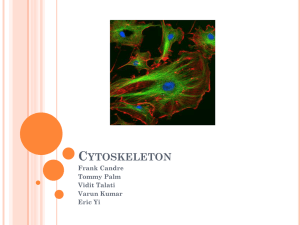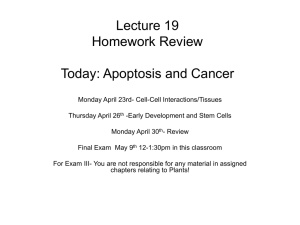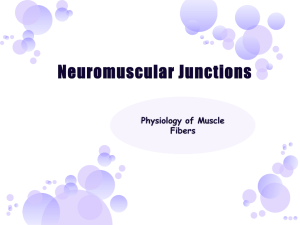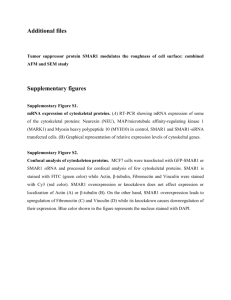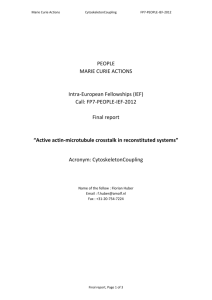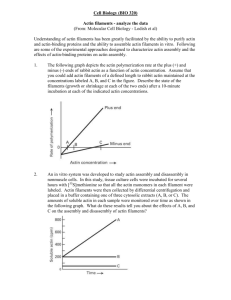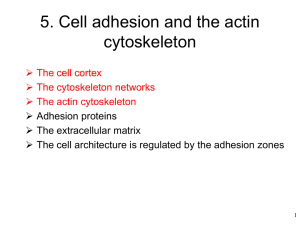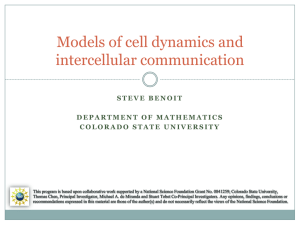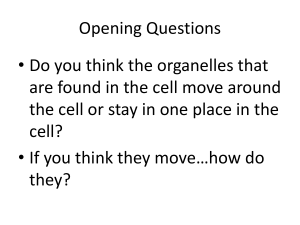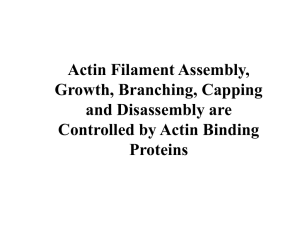Cytoskeleton bundling and its role in cell mechanics
advertisement
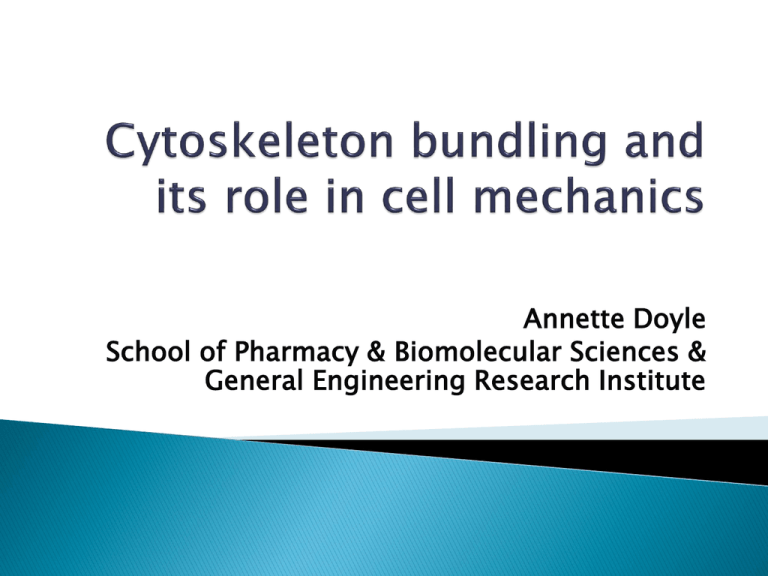
Annette Doyle School of Pharmacy & Biomolecular Sciences & General Engineering Research Institute The proteins that interact and bundle actin cytoskeleton have been shown to have high levels in various cancers Therefore we aim to determine if these proteins bundle actin and would therefore have an effect on the cytoskeleton's mechanical properties. The mammalian cell consists of a double membrane surrounding a viscous fluid (cytosol) which contains a central nucleus The Structure and mechanical integrity of the cell is governed by a mesh-like structure known as the cytoskeleton which is dispersed throughout the cytosol This cytoskeleton consists of 3 components: ◦ Microtubules ◦ Actin Filaments ◦ Intermediate Filaments Intermediate filaments (Green) Double Membrane Nucleus Microtubules (Blue) Actin Cortex (Red) The filaments interact with each other, the cell membrane, nucleus and cell substrate It has been suggested that the mechanical integrity of the cells is mainly due to the actin filaments with the microtubules and intermediate filaments contributing less In healthy cells the cytoskeleton is highly organised In cancer cells the cytoskeleton becomes disorganised Many diseases such as cancer, Alzheimer's disease, Parkinson’s disease, aging etc, are associated with changes in cellular structure, particularly with the structural element the cytoskeleton No one is certain about the full role of the cytoskeleton. However evidence shows that it is involved in: ◦ Underwriting the mechanical integrity of the cell. ◦ Acting as a messaging conduit. ◦ Influencing cell growth and division. ◦ Cell adherence and differentiation. Diseases change the cytoskeleton’s structure and may change the cell’s mechanical behaviour Cytoskeleton bundling is associated with other proteins in the cell Image actin filaments in the absence and presence of bundling protein using: Confocal microscopy Absorption Assay Transmission Electron Microscopy (TEM) AFM Actin+ protein 5:1 ratio Actin only Bundles formed in presence of protein Further image analysis will be carried out on images by Munther Gdeisat and Gary Johnston Absorbance Absorbance Absorbance Absorbance Absorbance Absorbance Actin Actin + protein Time (minutes) Quantitative measurement of polymerisation – l=300nm Initial rate of polymerisation different in the presence of protein Polymerisation more stable in the presence of protein Actin+ protein 5:1 ratio Actin only Actin only Actin only The AFM will be utilised to determine the size of actin filaments and bundles formed in the presence of the proteins. The ratio of actin:protein may have an effect on the bundle formations ◦ At present ratio of actin:protein is 5:1 ◦ A range of ratio from 1:1 to 5:1 will be investigated Images will be obtained using the confocal and AFM Image processing will be carried out by Dave Burton, Munther Gdeisat and Gary Johnson Higher levels of protein in the cell may cause more actin bundling or bigger bundles in the cytoskeleton As mention the cytoskeleton is involved in the mechanical integrity of the cell Changes to the cytoskeleton in the form of bundles may affect the elasticity or ‘stiffness’ of cells It has been reported that cancer cells are up to 70% less stiff than healthy cells This raises the question Do bundles restrict the response of the cell to force? The studies reported in the literature in regard to this actin bundling protein have been done from many species. Therefore it is difficult to accept what is found for plants and animals in regard to the human protein. For e.g. the yeast form of protein is only 80% similarity to human forms It has been reported that cations can cause actin bundling by electrostatic mechanisms and we will investigate the effect of buffer alone on actin bundling Also solution crowdedness has been reported to cause actin bundling-need to ensure correct controls present in experiments We will continue to look at actin polymerisation and bundling using the different bundling proteins Using yeast and mammalian cells models the level of protein in the cells will be increased We will investigates if over expression of the bundling protein has an effect on actin bundling and if such bundling has any possible influence on changes in cell mechanics. We will use AFM to measure the stiffness and combine AFM force measurements and confocal fluorescence imaging Mark Murphy Dave Burton Steven Crosby Stephane Gross Gary Johnston Munther Gdeisat
